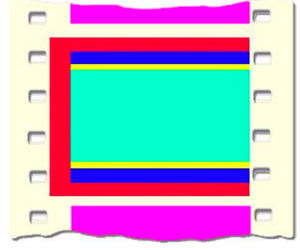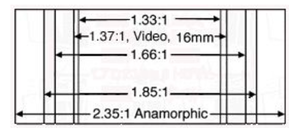| Welcome to Sprocket School! This project is maintained by volunteer editors. Learn more about how this works. |
Aspect ratios: Difference between revisions
Jump to navigation
Jump to search
No edit summary |
No edit summary |
||
| Line 40: | Line 40: | ||
[[File:Aspectratios-screen.png|center|thumb|300px|Aspect ratios as they appear on a full-width [[screen]].]] | [[File:Aspectratios-screen.png|center|thumb|300px|Aspect ratios as they appear on a full-width [[screen]].]] | ||
==External Links== | |||
* Essay: [http://www.northwestchicagofilmsociety.org/2012/07/02/invasion-of-the-aspect-ratios/ Invasion of the Aspect Ratios] | |||
[[Category:Film components]] | [[Category:Film components]] | ||
[[Category:Film prints]] | [[Category:Film prints]] | ||
[[Category:Showmanship]] | [[Category:Showmanship]] | ||
Revision as of 20:14, 10 August 2013
- List of them for various gauges
- 70mm aspect ratios?
- 16mm full frame, anamorphic, various matting
- ditto for other small gauges
- large gauges?
- Illustrations for each...
- Aperture plates
- Lenses
- Masking
- Determining correct aspect ratios for widescreen, etc.
- Eyeballing and measuring
- Educated guesses based on year, studio, country, etc
- Caveat: there is no "correct," historically - so contentious!
35mm Exhibition Aspect Ratios

| Gauge | Aspect Ratio | Other names | Year of Introduction | Notes |
|---|---|---|---|---|
| 35mm | 1.33:1 | Silent / Full Frame | 1907 | |
| 35mm | 1.19:1 | Movietone | 1926 | |
| 35mm | 1.37:1 | Academy ratio | 1932 | Sometimes incorrectly called 1.33 |
| 35mm | 1.66:1 | 1953 | Warning: widescreen formats may be soft-matted | |
| 35mm | 1.78:1 | ? | Used for films that originated on video. | |
| 35mm | 1.85:1 | Flat | 1953 | Warning: widescreen formats may be soft-matted |
| 35mm | 2.39:1 | CinemaScope / Anamorphic | 1953 | CinemaScope aspect ratios vary. |

Red 1.33, Blue 1.37, Yellow 1.66, 'Green 1.85
